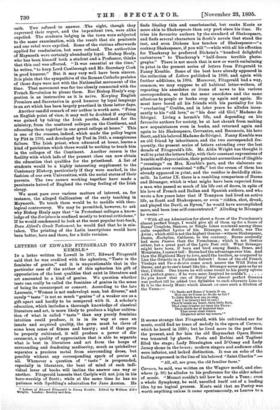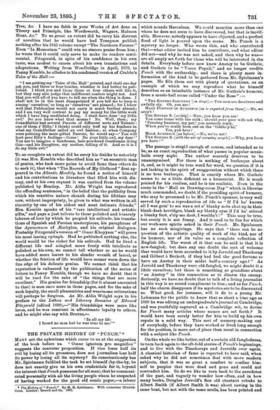LETTERS OF EDWARD FITZGERALD TO FANNY KEM BLE.*
IN a letter written to Lowell in 1877, Edward Fitzgerald said that he was credited with the aphorism, "Taste is the feminine of genius," and it is unquestionable that in the particular case of the author of this aphorism his gift of appreciation of the best qualities that exist in literature and art amounted to a kind of genius. We question whether taste can really be called the feminine of genius in the sense of being its counterpart or consort. According to the late Laureate, "Woman is not undevelopt man, but diverse," and surely " taste " is not so much " genius " of a weaker sex as a gift apart and hardly to be compared with it. A scholar's education, which includes a thorough knowledge of classical literature and art, is more likely to produce a higher cultiva- tion of what is called " taste " than any purely feminine intuition could produce, it is in its way at once an innate and acquired quality, the germ must be there of some keen sense of fitness and beauty ; and if that germ be properly cultivated, it will produce a power of dis- cernment, a quality of appreciation that is able to separate what is best in literature and art from the heaps of surrounding and deadening mediocrity, much as quicksilver separates a precious metal from surrounding dross, but possibly without any corresponding spark of genius at all. Whenever a question of " taste " is propounded, especially in literature, the bent of mind of each indi- vidual lover of books will incline the answer one way or another. Fitzgerald laments that Carlyle will not join in his hero-worship of Scott ; while at the same time he has no patience with Spedding's admiration for Jane Austen. He • Letters of Edward Fitzgerald to Fanny Kemble. Edited by William Aids Wright. London: Bentley and Bon.
finds Shelley thin and unsubstantial, but ranks Keats as more akin to Shakespeare than any poet since his time. He tries his favourite authors by the standard of Shakespeare, and finds several characters in Scott's novels that stand the test, and even Dickens has touches of Shakespeare—" a cockney Shakespeare, if you will "—while with all his affection for Thackeray he preferred Dickens's "hundred delightful caricatures" to Thackeray's "half-dozen terrible photo. graphs." There is not much that is new or worth embalming in print in the present series of letters from Fitzgerald to Fanny Kemble. Some of the best have already appeared in the collection of Letters published in 1839, and again with further additions, in 1894. Moreover, Fitzgerald had a way, common, we may suppose to all habitual letter-writers, of repeating his anecdotes or items of news to his various correspondents, so that the same anecdotes and the same allusions to people or books crop up again and again. He must have bored all his friends with his partiality for his "
everlasting" Crabbe, and in later years he alludes inces- santly to his "old love," or "his dear old Girl," Madame de Sevigne. Living a hermit's life, and depending on his favourite authors for society, he at last shrank from making new acquaintances even in books, and returned again and again to his Shakespeare, Cervantes, and Boccaccio, his hero Scott, and his beloved Madame de Sevigne. Fanny Kemble was an old friend by inheritance, and the two corresponded fre- quently, the present series of letters extending over the last decade of Fitzgerald's life. Mr. Aldis Wright has thought it well to print the letters fully, with their constant expressions of humble self-depreciation, their petulant accusations of illegible " crossings " on Mrs. Kemble's part, and the elaborate ex- planations over occasional "tiffs," but the cream of them has already appeared in print, and the residue is decidedly skim. milk. In Letter IX. there is a rambling comparison of Burns and Beranger, which is what might have been expected from a man who passed so much of his life out of doors, in spite of his love of French.and Italian and Spanish authors, and who wrote a few years later that if Tennyson had lived an active life, as Scott and Shakespeare, or even "ridden, shot, drunk, and played the Devil, as Byron," he would have accomplished more, and been less self-concentrated." Alluding to Beranger he wrote :— "With all my Admiration for about a Score of the Frenchman's almost perfect Songs, I would give all of them up for a Score of
Burns' Couplets, Stanzas, or Single Lines scattered among those quite imperfect Lyrics of his. Beranger, no doubt, was The Artist ; which still is not the highest Genius—witness Shakespeare, Dante, 2Eschylus, Calderon, to the contrary. Burns assuredly had more Passion than the Frenchman ; which is not Genius either, but a great part of the Lyric Poet still. What Beranger might have been, if born and bred among Banks, Braes, and Mountains, I cannot tell : Burns had the advantage over him. And then the Highland Mary to love, amid the heather, as compared to Lise the Grisette in a Parisian Suburb ! Some of the old French Virelays and Vat.z-de-vire come much nearer the Wild Notes of Burns, and go to one's heart like his ; Beranger never gets as far as
that, I think. One knows he will come round to his pretty refrain
with perfect grace; if he were more Inspired be couldn't Da you know that one of Burns' few almost perfect Stanzas
was perfect till he added two Syllables to each alternate Line to fit it to the lovely Music which almost E ;uses such a dilution of the Verse:— 'Ye Banks and Braes o' bonnie D on. How can ye b`oom (s3 frish) so fair ? Ye little Birds how eau ye sing, And I so (weary) fall of care!
Thou'lt break my heart, thou little Bird, That sings (singest so) upon the Thorn: Thou minds me of departed days That never shall return (Depaited never to) return."
It seems strange that Fitzgerald, with his cultivated ear for music, could find no trace of melody in the opera of Carmen, which he heard in 1880; but he lived more in the past than the present, and for him the old Haymarket Opera House was tenanted by ghosts. Pasta and Rnbini and Taglioni filled the stage ; Lady Blessington and D'Orsay and Lady Jersey shone in the boxes; modern singers and audience alike were inferior, and lacked distinction. It was an echo of the feeling expressed in the line of his beloved "Saint Charles " :— " All, all, are gone, the old familiar faces."
Carmen, he said, was mitten on the Wagner model, and else- where (p. 80) he alludes to his preference for the older school of music. "Mozart couldn't tell how he made a Tune ; even a whole Symphony, he said, unrolled itself out of a leading idea by no logical process. Keats said that no Poetry was _worth anything unless it came spontaneously, as Leaves to a
Tree, &c. I have no faith in your Works of Art done on Theory and Principle, like Wordsworth, Wagner, Holman Hunt, ctc." To so great an extent did be carry his distrust of novelties that he would have had Tennyson publish nothing after his 1842 volume except" The Northern Farmer."
Even "In Memoriam" could win no sincere praise from him ; he wrote that it could only serve to make its readers senti- mental. Fitzgerald, in spite of his confidence in his own taste, was modest to excess about his own translations and adaptations. Writing from Woodbridge in April, 1879, to Fanny Kemble, he alludes to his condensed version of Crabbe's Tales of the Hall :—
"I am getting my Tales of the Hall' printed, and shall one day ask you, and three or four besides, whether it had better be pub- lished. I think you and those three or four others will like it, but they may also judge that indifferent readers might not. And that you will all of you have to tell me when the thing is done. I shall not be in the least disappointed if you tell me to keep it among ourselves,' so long as 'ourselves' are pleased ; for I know well that Publication would not carry it much further abroad; and I am very well content to pay my money for the little work which I have long meditated doing. I shall have done ' my little owl.' Do you know what that means ? No. Well, then ; my Grandfather had several Parrots of different sorts and Talents : one of them (` Billy,' I think) could only huff up his feathers in what my Grandfather called an owl fashion; so when Company were praising the more gifted Parrots, he would say= You will hurt poor Billy's feelings — Come ! Do your little owl, my dear !' You are to imagine a handsome, hair-powdered Gentleman doing this—and his Daughter, my mother, telling of it. And so it is I do my little owl."
To so complete an extent did he carry his dislike to notoriety (it was Mrs. Kemble who described him as "an eccentric man
of genius, who took more pains to avoid fame than others do to seek it), that when "The Records of My Girlhood" first ap- peared in the Atlantic Monthly, he found a notice of himself and his contributions to literature that filled him with dis- may, and at his own request it was omitted from the volume published by Bentley. Mr. Aldis Wright has reproduced the offending sentences, "in the belief that the publicity from which his sensitive nature shrank during his lifetime may now, without impropriety, be given to what was written in all sincerity by one of his oldest and most intimate friends." Mrs. Kemble speaks of his "rare intellectual and artistic gifts," and pays a just tribute to those polished and leisurely labours of love by which he peopled his solitude, his transla- tions of Spanish and Persian masterpieces, his paraphrase of the Agamemnon of _ZEichylus, and his original dialogues.
Probably Fitzgerald's version of " Omar Khayyam " will prove his most lasting epitaph. Had he published nothing else, the world would be the richer for his solitude. Had he lived a different life and mingled more freely with intellects as polished as his own, we cannot tell whether or no he would have added more leaves to his slender wreath of laurel, or whether the friction of life would have sooner worn down the tine edge of his delicate genius. We cannot think that his reputation is enhanced by the publication of the series of letters to Fanny Kemble, though we have no doubt that it will be read for the sake of "the things that are more excellent." His genius for friendship (for it almost amounted to that) is seen once more in these pages, and for the sake of such loyalty, the small pleasantries and wearisome reiterations will perhaps be forgiven. As Mr. Aldis Wright says in his preface to the Letters and Literary Remains of Edward Fitzgerald (edited 1889),—" His friendships were more like loves, and he was constant in affectionate loyalty to others, and he might also say with Brutus,—
' In all my life
I found no man but he was true to me."











































 Previous page
Previous page